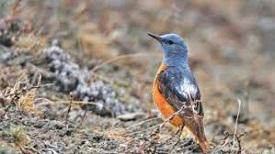Current Affairs February 2017 - Environment
News 1 - A 540-million-year-old human ancestor discovered

Scientists discovered fossil traces of the 540million-year-old microscopic sea animal ‘Saccorhytus’. Scientists discovered that Saccorhytus was about a millimetre in size, and is thought to have lived between grains of sand on the sea bed. The researchers discovered Saccorhytus as the most primitive example of a category of animals called "deuterostomes" which are common ancestors of a broad range of species.
The study was carried out by an international team of researchers, from the UK, China and Germany. Among them was Prof Simon Conway Morris, from the University of Cambridge.
News 2 - New bird species discovered in Nepal

A new species of birds has been discovered in the high mountainous region of Nepal, near the Shey monastery within the SheyPhoksundo National Park. It brought the total number of avian species in the Himalayan country to 866.
Researchers from an NGO Friends of Nature (FoN) Nepal spotted the Rufous-tailed Rock Thrush (Monticola saxitilis) last year. Rufoustailed Rock Thrush is considered an autumn passage migrant bird species in Pakistan and India.
News 3 - January 2017 was the third-warmest January on record: NASA

January 2017 was the third warmest January in 137 years of modern record-keeping, as per a monthly analysis of global temperatures by scientists at NASA's Goddard Institute for Space Studies (GISS) in New York.
Last month's temperature was 0.20 degrees’ Celsius cooler than the warmest January in 2016. However, it was 0.92 degrees Celsius warmer than the mean January temperature from 1951-1980. Two of the three top January temperature anomalies have been during the past two years.
News 4 - India’s only volcano active again

The country’s only active volcano located in the remotest Barren Island in Andaman has begun spewing smoke and lava again. A team of scientists led by Dr. Abhay V Mudholkar from National Institute of Oceanography, Goa, reported that the volcano is active.
The Barren Island volcano, located 140-km north-east of Port Blair, dormant for more than 150 years, started erupting in 1991 and has since then shown intermittent activity.
News 5 - Indian scientists discovered seven new miniature frog species

Indian scientists have discovered seven new miniature frog species in the Western Ghats after five years of extensive exploration. These frog species can comfortably sit even on a child's thumbnail.
The study conducted by two Delhi Universitybased researchers. The new miniature frogs were found under damp forest leaf litter or marsh vegetation. The study, titled "Seven new species of Night Frogs from the Western Ghats Biodiversity Hotspot of India, with remarkably high diversity of diminutive forms", was published in PeerJ, a peer-reviewed open access journal.
News 6 - Pests eat away 30-35% of total crop yield in Indi

As per the scientists of Indian Council of Agricultural Research (ICAR), pests eat away about 30-35% of the annual crop yield in India.
Among such pests, nematodes (microscopic worms many of which are parasites) have caused loss of 60 million tonnes of crops annually or 10-12 % of crop production every year. Nematodes consist of roundworms, threadworms and eelworms. Total number of nematode species has been estimated to be about 1 million.








